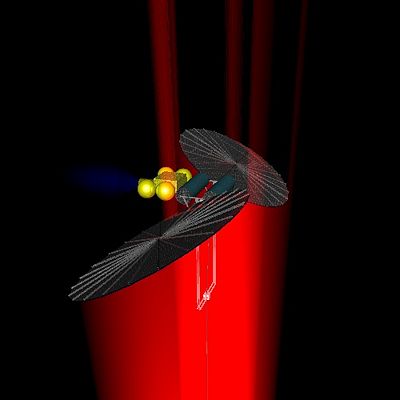SpaceElevatorDeployment: Difference between revisions
From SpaceElevatorWiki.com
Jump to navigationJump to search
No edit summary |
|||
| Line 14: | Line 14: | ||
|Mass of first ribbon || 40 tons|| Launched in two separate spools, ribbon is full length but a total of 20 cm wide | |Mass of first ribbon || 40 tons|| Launched in two separate spools, ribbon is full length but a total of 20 cm wide | ||
|- | |- | ||
|Spacecraft propoulsion || MPD || Electromagentic with very high ISP [[Image:AdvancedPropMod. | |Spacecraft propoulsion || MPD || Electromagentic with very high ISP [[Image:AdvancedPropMod.ods]] | ||
|- | |- | ||
|Power source || MW of beamed power || Power for MPD is beamed up from the ground using the same power systems as planned for the climbers but located at distributed points around the equator | |Power source || MW of beamed power || Power for MPD is beamed up from the ground using the same power systems as planned for the climbers but located at distributed points around the equator | ||
Revision as of 05:13, 14 July 2008
The Deployment
Deploying the ribbon takes innovation and care. The ribbon can not be simply thrown up into space neither can it be blindly dropped down from orbit. The deployment spacecraft is to deliver the first ribbon then climbers will build up and strengthen the ribbon to the point where it is usable.
| Dimension | ||
| Spacecraft Mass | 80 tons | Launched in sections to LEO, combined then moved to GEO. Roughly half of the launched mass is ribbon, 1/3 spacecraft and remainder fuel. |
| Mass of first ribbon | 40 tons | Launched in two separate spools, ribbon is full length but a total of 20 cm wide |
| Spacecraft propoulsion | MPD | Electromagentic with very high ISP File:AdvancedPropMod.ods |
| Power source | MW of beamed power | Power for MPD is beamed up from the ground using the same power systems as planned for the climbers but located at distributed points around the equator |
| Deployment time for first ribbon | 2 weeks | This is determined by the maximum speed of the spools and rollers on the spacecraft. The deployment and expansion must be done quickly to minimize possible impacts and degradation |
| First climber size | 1 ton | |
| Number of construction climbers | 280 | Climbers grow in size as the ribbon grows and can support more |
| Construction time | 2.5 years | This is for the first stable elevator with 20 ton maximum mass climbers. A system capable of carrying a 100 ton climber would take an additional year to construct. |

The working climber design is File:Deployment Spacecraft.dxf. Notes on the design are located File:DeploySpacecraftnotes.odt here.
Status
Large Spacecraft have been built and operated Need additional work on launching first ribbonInclude images and videos Include design write-ups
The deployment spacecraft should be largely built with conventional satellite technology.
Major Work Items
- Spooling of the initial ribbon for launch
- Design and demonstration of splicing techniques for construction of the ribbon
Additional Work Needed
| Item | Notes | Completed and Ongoing Efforts |
| Overall system engineering | Overall satellite constraints and components need to be defined along with the trade-offs for overall performance and subcomponents | |
| Categorize available electromagnetic propulsion systems of the size required | Define, performance, mass, maturity, cost, | |
| Examine large scale ribbon spooling techniques | ||
| Ribbon deployment | dynamics, speed, matching tension in multiple ribons, attaching ribbons end-to-end. | |
| Overall structure design | Minimize mass, design to handle oscillations, operation in unidirectional gravity field (0 - 0.1G) | |
| Retrieving the end of the ribbon at Earth | General scenario, issues, end unit design, performance requirements | |
| Operations | Work out a detailed operational scenario including fault handling, despooling and speed control |